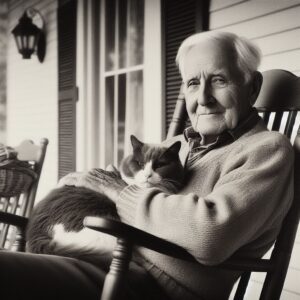The Physical Health Perks
Dogs necessitate and encourage routine exercise due to their innate need for activity. This includes daily walks, fetch games in a park, and other similar activities that involve movement. These daily routines displace sedentary lifestyle habits that often accompany old age, promoting healthier habits in seniors.
Exercising with pets is enjoyable and spontaneous, making it a more sustainable long-term habit. This regular physical activity effectively aids in controlling and maintaining body weight for pet owners and increases their overall fitness levels.
The American Heart Association confirms that exercising with pets helps lower blood pressure, pulse rate, and cholesterol levels. As prevalent heart diseases are common among the elderly, pets, by promoting an active lifestyle, play a vital role in cardiovascular health management.
Simple activities like walking a dog or grooming a pet can help improve hand-eye coordination and joint mobility. These movements, which may seem marginal, collectively contribute to a senior’s physical health and vitality.
A sedentary lifestyle may lead to obesity, Type 2 diabetes, and can increase susceptibility to certain types of cancer. Pets require attention and care, subtly encouraging their owners to stay mobile throughout the day.
Pets as Emotional Companions
 The golden years can often bring certain solitude to people’s lives due to factors like retirement, living alone, or the loss of loved ones. Being a pet owner creates a cycle of care and affection that ensures constant interaction, thereby reducing feelings of solitude. Their dedicated presence can lift the spirits of owners, leading to significantly more contentment and satisfaction in daily life.
The golden years can often bring certain solitude to people’s lives due to factors like retirement, living alone, or the loss of loved ones. Being a pet owner creates a cycle of care and affection that ensures constant interaction, thereby reducing feelings of solitude. Their dedicated presence can lift the spirits of owners, leading to significantly more contentment and satisfaction in daily life.
Pets are capable of providing an unwavering safety net against emotional distress. They naturally detect fluctuations in their owner’s emotional state and offer quiet solidarity in return. This comforting presence can help alleviate feelings of anxiety and stress, resulting in more stable emotional health.
Studies reveal that the companionship of pets can lead to decreased depression and feelings of loneliness, lower blood pressure, and improved mood. Pets help create a more positive emotional environment.
Their natural charm and appeal can draw attention from others, initiating simple yet meaningful social interactions. A walk in the local park with a pet can stimulate conversations with fellow dog owners or passers-by.
These interactions present opportunities to build friendships and social networks. This is particularly beneficial to seniors who might otherwise struggle with social isolation.
Cognitive Boost
Pet owners must remember feeding times, veterinary appointments, and when to replenish pet supplies. Performing these tasks regularly helps seniors reinforce their short-term memory, which is often susceptible to age-related decline. Through regular interactions and shared responsibilities with pets, people can enhance and maintain their cognitive skills, even in their advanced years.
Playing with pets introduces unforeseen circumstances that prompt problem-solving skills. Pet owners must navigate different situations such as figuring out a pet’s peculiar behavior or finding ways to ensure pets comply with house rules. These spontaneous tasks help sharpen the brain, keeping it active and fit. Problem-solving also involves using cognitive flexibility, an important skill for adapting to new or unexpected circumstances in life.
The necessity to stay alert and aware can indirectly stimulate cognitive function. Attention to detail, keen observation, and swift decision-making are naturally enhanced through interactions with pets. Pets are unpredictable, and their antics necessitate quick, intelligent responses from owners which, in turn, help in honing cognitive nimbleness.
Purpose and Responsibility
Pet owners, by caring for their pets’ physical and emotional requirements, find themselves engaged in a purposeful routine. Duties like feeding, grooming, and providing companionship become central to their daily life. These tasks engender a sense of motivation and satisfaction that boosts the owner’s self-esteem and sense of worth.
Owning a pet necessitates the conscious embracing of responsibility. It involves the acknowledgment of the pet’s dependency on one for its care and well-being. This nurtures a sense of accomplishment, as fulfilling this role promotes personal relevance and significance in the pet’s life.
Managing dietary requirements, taking the pet for regular veterinary check-ups, and ensuring that the pet feels loved and secure are all part of this responsibility. It calls for sustained commitment, thereby promoting mental agility, emotional resilience, and physical activity in older pet owners.
Choosing the Right Pet
 For individuals who lead a sedentary lifestyle, a pet with lower energy and activity demands may be more suitable, such as certain breeds of cats or smaller dogs. Those with an active lifestyle may find a high-energy dog more compatible.
For individuals who lead a sedentary lifestyle, a pet with lower energy and activity demands may be more suitable, such as certain breeds of cats or smaller dogs. Those with an active lifestyle may find a high-energy dog more compatible.
Personal preferences profoundly influence pet selection. This ranges from having a preference for a furry companion or a more exotic pet like a reptile to a preference for a specific size, breed, or animal with certain behaviors.
Pets necessitate a significant amount of time for feeding, exercise, training, and social interaction to ensure they stay healthy and content. The financial implications of pet ownership, including food costs, veterinary care, grooming, and potential pet insurance, should also be recognized.
Potential pet owners must assess their living space and ensure that they can provide an environment conducive to a pet’s comfort and mobility. Larger pets require more living space while smaller pets or those with low activity needs can manage well in smaller spaces.
Researching extensively about potential pets is important for making an informed decision. Understanding a pet’s lifespan, energy level, dietary needs, healthcare requirements, and behavioral tendencies can provide important insight into what pet ownership will encompass.
The joys and benefits of pet ownership extend into old age, offering a multiplicity of physical, social, and mental benefits. Pets can be fitness partners, loyal companions, social facilitators, mental stimulants, and much more. When appropriately selected to match the needs and capacities of an individual, pets have transformative power, bringing warmth and vitality back to the lives of seniors.